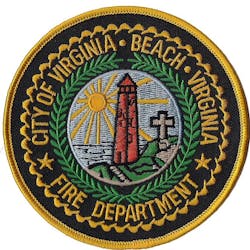VA Firefighter Beat Cancer, Now He Needs Claim Help
By Alissa Skelton
Source The Virginian-Pilot
VIRGINIA BEACH—For more than 40 years, Stan Morse fought fires in Virginia Beach.
In his early years, he sometimes fought flames without a breathing apparatus, choking down the smoke and carcinogens.
Morse also spent years cleaning the underside of firetrucks with a toxic chemical that has since been taken off the market. He breathed in diesel engine fumes powerful enough to blacken the fire station walls.
Then, six months after he retired as a captain, he discovered a swollen lymph node on his neck. Not long after, he learned he had throat cancer.
Yet, when he submitted a claim for workers' compensation to cover his medical expenses, the state denied it.
The reason? He didn't identify a specific incident or exposure to a carcinogen that triggered his disease. Morse appealed and has a hearing on March 22.
“I don’t know anyone who can prove how they got cancer,” Morse said. “I could list a number of carcinogens I was exposed to.”
Now, he's turning to Virginia Beach's leaders for help. On Feb. 5, the council directed City Manager Dave Hansen to examine his case to decide whether a special exception should be made for him.
“I am asking for your help,” he said.
The 59-year-old has undergone radiation and chemotherapy. The treatments burned his throat to the point where he couldn’t swallow food. He refused a feeding tube and lost 60 pounds over a couple of months.
Bill Bailey, a retired Virginia Beach firefighter and president of the Virginia Beach Professional Firefighters, is trying to help.
In the 1970s, when Morse started, the department did not have the same education and protocols to prevent firefighters from getting cancer. Even the gear they use has been updated, Bailey said. The department's priority now is to reduce firefighters' exposure to carcinogens.
“Every legal expert I talk to says he doesn’t have a chance because he can’t prove what he was exposed to and when,” Bailey said. “We are not talking about a precedent-setting event — we are talking about one firefighter. Please, give him a lifeline.”
Del. Barry Knight of Virginia Beach is also advocating for Morse. They met more than 35 years ago when they played softball together. Morse reconnected with Knight last summer at a team reunion organized to support another player with cancer. Morse told Knight about the problems he sees with a state law that helps firefighters if they get certain diseases that were caused by the job.
“I know that Stan’s throat cancer came from fighting fires,” Knight said.
The law first recognized heart and lung illnesses as occupational diseases in the 1970s. Bailey said those have been granted more leeway even if the person can’t prove its cause.
The statute also says people who suffer from leukemia, pancreatic, prostate, rectal, throat, ovarian or breast cancer are eligible for compensation if they came into contact with a toxic substance.
That’s where it gets tricky.
The law makes it difficult for first-responders to qualify because it requires proving which dangerous substance they were exposed to.
The wording of the law needs to change, Bailey said.
The House and Senate decided to study the issue. The General Assembly is also considering adding a few more cancers — colon, brain, and testes — to the list.
Knight said he is hopeful that the legislature will take up the debate during the next session.
Of course, changes could cause more first responders to submit claims, which would be costly, Bailey said.
“It is hard to believe people’s lives come down to a dollar sign, but they do,” Morse said.
In December, doctors told Morse they could not see any more cancer cells. He knows he will never be declared cancer-free. Now he is living with the side effects of treatment, including hearing loss and eating difficulties. Morse said he will have to check in with specialists for the rest of his life.
"I can put up with these side effects when you consider the alternative," he said. "But I go to the mirror every morning and look for lumps. Whenever I get a sore throat I think, 'Oh no, it is back.'"
———
©2019 The Virginian-Pilot (Norfolk, Va.)
Visit The Virginian-Pilot (Norfolk, Va.) at pilotonline.com
Distributed by Tribune Content Agency, LLC.






